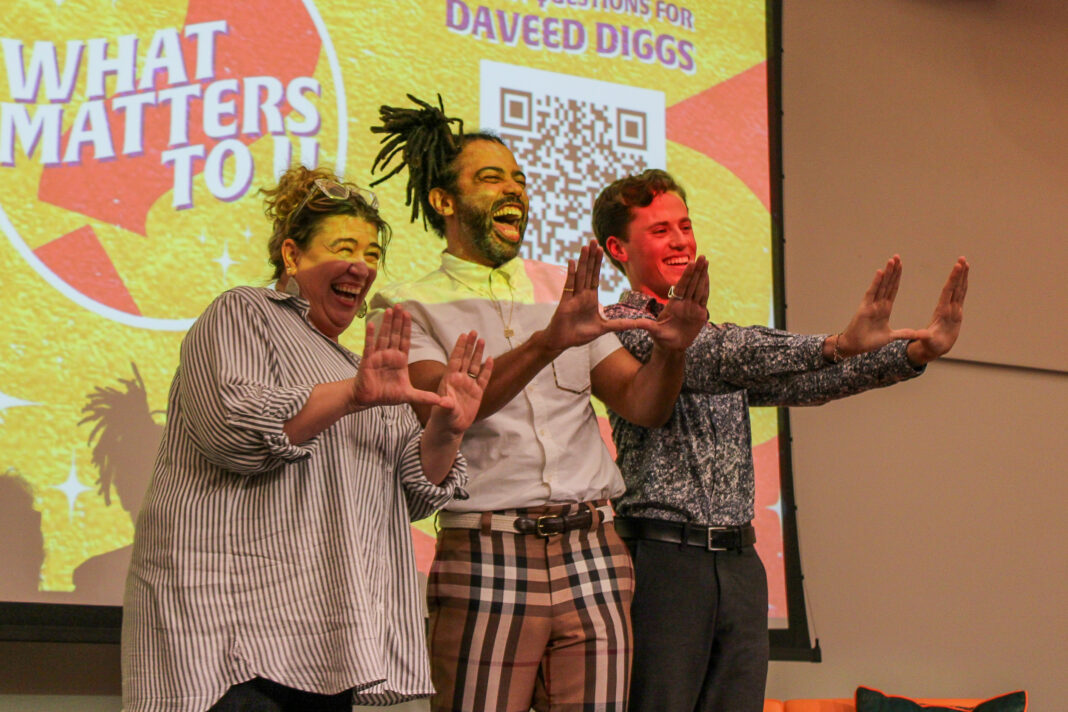
Whether he’s rapping on the Broadway stage or voicing a character in a children’s movie, when it comes to entertainment, Daveed Diggs has done it all. Students had the chance to attend a conversation with the acclaimed rapper and actor at the “What Matters to U” Spring discussion on Thursday.
What Matters to U is a UM student government agency dedicated to bringing high-profile figures to discuss topics relevant to the UM community.
In the conversation moderated by B.F.A. musical theatre senior Keenan Lyons and assistant professor Jessica Bashline, Diggs shar1ed insights regarding his community, creativity and experiences with diversity in the arts.
Having explored his creative passions at Brown University, Diggs shared the importance of taking advantage of university resources to consistently create — even if it’s terrible.
“School is about learning, it’s about making things,” Diggs said. “Whatever your thing is, produce as much as you can while you’re here — but you shouldn’t worry about it being good.”
“You should probably never worry about it being good, but really not when you’re here. Not when you’re learning. Because learning is about learning, and one of the best ways to learn is to make something terrible.”
Diggs is best known for originating the roles of Marquis de Lafayette and Thomas Jefferson in the Broadway-hit musical “Hamilton.” He won several awards for his performance, including the Tony Award for Best Featured Actor in a Musical and the Grammy for Best Musical Theater Album.
Diggs also voiced Sebastian in the 2023 live action version of “The Little Mermaid,” Spruce in “Trolls Band Together” and played a recurring role in the TV series “black-ish.” He is also a vocalist for the hip-hop group Clipping, set to begin touring Europe at the end of the month.
Raised in Oakland, Calif., Diggs recalls always having been in the art scene — whether he was visiting the record store or performing slam poetry, the local community shaped his creative dialogue.
His experiences in the Bay Area would eventually influence how he portrayed the character Collin in “Blindspotting.” The movie-later-turned-TV-show that Diggs produced and starred in told the story of a parolee with three days left on his sentence who witnesses a police shooting that threatens to ruin a lifelong friendship.
“We wrote ‘Blindspotting’ right around the time when Oscar Grant was murdered in Oakland, anybody in the town is dealing with these things already,” Diggs said in an interview with The Hurricane. “That’s where we had to meet our characters. Collin’s genuinely afraid of being murdered by the police — and so was I when I was that age and so am I now.”
Diggs left the West Coast for college, heading to Providence, R.I., after being recruited for the track team at Brown University, where he would eventually pursue performing arts.
“I didn’t really mean to choose theater as my major. My college was one of those places where you can take whatever, and a lot of people want to create a major when they go there,” Diggs said. “So that’s what I thought I was doing — I was teaching a lot at the time, so I was going to do this arts education thing. But then, I looked around and had finished all of the theater major concentration.”
He had visited the school with recruiters the spring before his freshman year, something he joked was a “trap” because at the time the campus was beautiful, but surprised him in the winter.
Coming to the University of Miami for competitions was a highlight in his college experience, as he looked forward to the warm weather.
Before he pursued acting, Diggs taught poetry to middle schoolers in the Bay Area where he grew up.
“I was going into schools and working with the English and social studies teachers to design my curriculum. I would figure out what they needed to touch on during the year, and on my first day of class, I would ask everybody what they were listening to,” Diggs said.
“I was listening to everything at the time, so I would probably know it. But the stuff I didn’t know, I would go home to study and I would start developing my lessons based on that. The great thing about performance poetry back when I used to do that was it comes out of the community and that’s why I was into it.”
In his professional career, Diggs doesn’t shy away from projects that attract commentary. Whether it was diversifying the stage on Broadway or taking roles in shows like “black-ish,” Diggs uses his talents to advocate for social change. He shared insight into what it was like being a part of these projects.
“The thing that I love that Lin [Manuel-Miranda] always said about Hamilton was that as opposed to the culturally radical casting that people were commenting on — for him, he needed people with a particular set of skills to pull off the show he had written, and these were his friends who had those skills and we happen to look like this,” Diggs said.
He even noted that by diversifying projects and adding perspectives, stories are better told.
To close the conversation, Diggs offered a piece of advice to the aspiring artists and creatives in the room.
“You have to sell your perspective,” Diggs said. “The only thing I have to offer is my personal tastes and take on something.”
The moderators then led a live Q&A, where Diggs answered students’ questions ranging from funny memories during his time in Hamilton to his favorite projects that in his opinion “no one cared about.”
As is WMTU tradition, the moderators taught Diggs how to throw up the U to close out the night.




